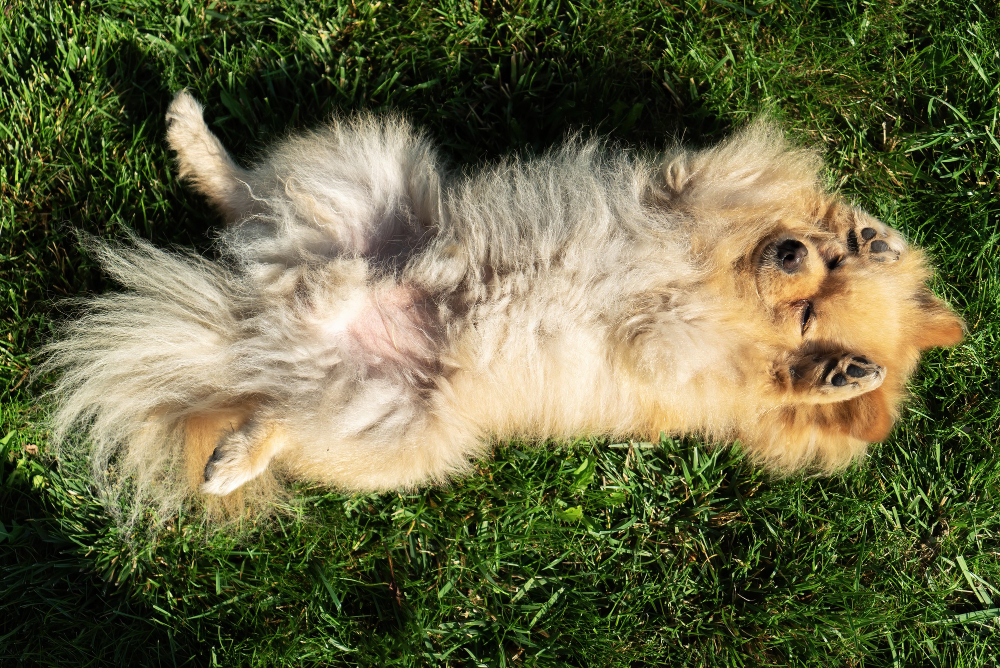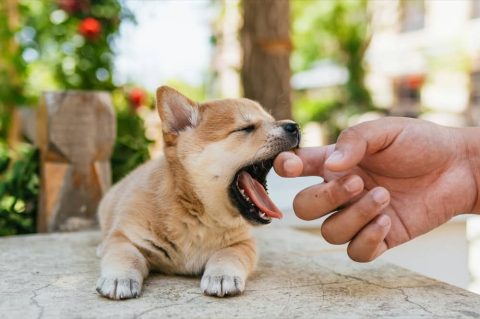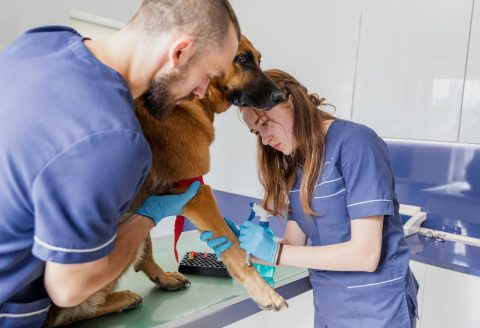Have you ever been jolted by your dog’s belly sounding like distant thunder? While occasional murmurs and gurgles are perfectly normal as your pup digests a meal, persistent or unusually loud stomach noises—often called “dog stomach noises” or a “rumbling dog tummy”—can indicate underlying digestive issues. Understanding why your dog’s stomach might be so noisy is the first step toward keeping their digestive health on track. Below, we explore seven common causes of a rumbling dog tummy, signs that warrant a trip to the veterinarian, practical preventive strategies, and key takeaways for everyday care.
Contents
7 Common Causes of a Rumbling Dog Tummy
1. Excessive Gas
Gas buildup in your dog’s digestive tract can occur when they swallow air while eating too quickly or digest foods that ferment in the gut. High-fat meals, table scraps, and low-quality kibble with fillers (like excessive soy or corn) can all contribute to excessive flatulence and loud post-meal gurgling. In some cases, dogs with sensitive stomachs may produce sulfurous odors when the gas is expelled.
– Signs: Audible gurgles soon after eating; frequent passing of gas; occasional abdominal discomfort.
– What to do:
– Switch to a high-quality, easily digestible diet.
– Use a slow-feeder bowl or puzzle feeder to reduce gulping.
– Consider adding a vet-approved probiotic supplement to balance gut flora.
2. Food Intolerances or Allergies
Food sensitivities—such as lactose intolerance or reactions to proteins like chicken or beef—can inflame the intestinal lining, leading to bloating, diarrhea, and persistent “dog stomach noises.” Unlike true allergies that trigger an immune response, intolerances stem from the gut’s inability to break down certain ingredients.
– Signs: Loose or unusually colored stools; chronic itching or skin rashes; ear infections; bouts of vomiting.
– What to do:
– Work with your veterinarian on an elimination diet trial.
– Introduce novel protein sources (e.g., rabbit, venison) if common proteins are problematic.
– Opt for limited-ingredient diets or prescription hypoallergenic formulas when recommended.
3. Ingesting Foreign Material
Dogs are notorious scavengers: from picnic leftovers to socks or small toys, foreign objects in the stomach can trigger loud noises as the digestive tract struggles to process or move the obstruction. Fatty scraps—especially from fried foods—can also lead to acute pancreatitis, which often begins with noticeable gut sounds.
– Signs: Sudden onset of loud gurgling; repeated attempts to vomit; drooling; lack of appetite.
– What to do:
– Puppy-proof or “dog-proof” your home by securing trash bins and removing small ingestible items.
– Reinforce “leave it” and “drop it” commands during walks and indoor play.
– Monitor for additional symptoms; seek veterinary care if ingestion of non-food objects is suspected.
4. Intestinal Parasites
Parasites such as roundworms, hookworms, whipworms, and giardia live in the intestinal tract and compete for nutrients, disrupting normal digestion. Their presence often leads to increased gut motility and rumbling noises.
– Signs: Diarrhea (sometimes with mucus or blood); visible worms or worm segments in feces; weight loss despite normal appetite; dull coat.
– What to do:
– Schedule routine fecal examinations (at least once or twice a year).
– Administer veterinarian-recommended dewormers on schedule.
– Maintain good hygiene: promptly clean up feces and avoid standing water.
5. Gastrointestinal Infections
Bacterial infections (e.g., Salmonella, Clostridium) or viral diseases (e.g., parvovirus in puppies) can inflame the stomach and intestines, leading to loud, aggressive gurgles and sloshing sounds. These infections may spread through contaminated food, water, or contact with infected animals.
– Signs: Fever; dehydration; acute vomiting and diarrhea; lethargy; loss of appetite.
– What to do:
– Isolate your dog from other pets to reduce spread.
– Provide bland diets (boiled chicken and rice) under veterinary guidance.
– In severe cases, hospitalization and IV fluids may be necessary.
6. Bowel Obstruction
Obstructions occur when indigestible items—such as bones, fabric, or toys—block the intestinal tract. The body’s attempts to force material past the blockage often produce loud, distressing rumbling. Without prompt treatment, obstructions can lead to tissue necrosis and life-threatening complications.
– Signs: Intensely loud gurgling; repeated vomiting (sometimes projectile); straining to defecate or no bowel movements; abdominal pain; depression.
– What to do:
– Treat as a medical emergency—do not wait for symptoms to worsen.
– Your veterinarian will use imaging (X-rays or ultrasound) to confirm obstruction.
– Most obstructions require surgical removal; follow postoperative care strictly.
7. Chronic Gastrointestinal Disorders
Long-term conditions—such as inflammatory bowel disease (IBD), exocrine pancreatic insufficiency (EPI), or chronic gastritis—cause intermittent or persistent digestive noises and symptoms. In many cases, these disorders involve immune-mediated inflammation or enzyme deficiencies.
– Signs: Recurring bouts of diarrhea or vomiting; chronic weight loss; fluctuating appetite; intermittent abdominal discomfort.
– What to do:
– Your vet may recommend blood panels, imaging studies, or endoscopy for diagnosis.
– Management often includes prescription diets (hydrolyzed proteins or low-fat formulas) and medications (anti-inflammatories or enzyme supplements).
– Monitor your dog’s response to treatment and adjust under veterinary supervision.

When to Consult Your Veterinarian
Even if many cases of dog stomach rumbling resolve with simple home care, certain red flags mean veterinary evaluation is essential:
- Persistent vomiting or diarrhea lasting more than 48 hours
- Blood or mucus in vomit or stool
- Black, tarry stools, indicating potential internal bleeding
- Extreme lethargy, weakness, or dehydration
- Visible worms or unusual spots in feces
- Straining without producing stool for over 24 hours
- Signs of pain when the abdomen is touched
Prompt intervention can prevent a minor digestive upset from escalating into a life-threatening emergency.
Preventive Strategies for a Quiet, Comfortable Tummy
- Dietary Management
- Choose high-quality dog food with real meat sources and minimal fillers.
- Feed smaller, more frequent meals to reduce gas buildup.
- Introduce new foods gradually over 7–10 days to allow gut adaptation.
- Hydration and Exercise
- Ensure constant access to clean water to aid digestion and nutrient absorption.
- Regular exercise supports healthy gut motility and reduces gas buildup.
- Parasite Control
- Follow a veterinarian-recommended deworming and flea/tick prevention schedule.
- Practice good backyard and kennel hygiene to minimize reinfection risk.
- Mental Enrichment
- Use puzzle feeders or interactive toys to slow eating and reduce gulping of air.
- Provide stress relief through play and training, as anxiety can worsen GI symptoms.
- Routine Veterinary Check-ups
- Schedule annual wellness exams including fecal tests and blood work.
- Discuss any subtle changes in appetite, stool quality, or behavior promptly.
Conclusion
A noisy, rumbling dog tummy isn’t always cause for panic—often it’s a minor dietary hiccup or harmless gas. By paying attention to your dog’s eating habits, maintaining parasite prevention, feeding high-quality nutrition, and seeking timely veterinary care when red flags arise, you can help ensure your pup’s digestive system stays calm, comfortable, and free of disruptive gurgles. Keeping your dog’s tummy happy means fewer worries and more enjoyable moments together.







